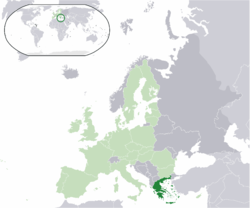Greece Politics: A Who’s-Who Of Chaos And Exhaustion – OpEd
By Dimitra Karantzeni
As the days go by, the current chaos in Greece is rendered more and more perplexing and unwieldy, so much so that one might assume that this country likes to put itself into a permanent submissive position of misery. It’s like the hypocrisy of past generations is somehow infused into people’s DNA.
First of all, when it comes to Greek citizens, they often declare that they are conscientious, hardworking, inherently democratic people who honor the ancient legacies of Plato, Aristotle and the other philosophers of Antiquity. What is less readily admitted however, is that Greeks are primarily responsible for their long downfall and boundless international humiliation. It’s all because of a corruption so deep that it could not be isolated in the political field but rather had to be treated as a holistic whole; one that touches every aspect of everyday personal and social life.

Even now that bankruptcy is a reality that we all experience- though one that no one dared to officially announce- Greek leaders remain free, beneficiaries of the people’s endless tolerance, to arrange lives as they wish by playing Russian roulette in the salons of the Troika. They then turn back to the people, sometimes with bombastic nationalistic elations for the salvation of the country, and other times hiding their tail between their legs.
Nevertheless, this is just one side of the coin, as the country’s political system seems equally unable to escape its voracious self. To begin with, the ruling New Democracy (ND) party appears as a manifestation of a center-right political force, though one that struggles to fight its own conservative nature. Before winning the elections, ND intensively opposed the memorandum and its harsh terms, accusing the ruling party PASOK (Panhellenic Socialist Movement) of betraying national sovereignty. Today, New Democracy ironically tries to coexist and maintain unity in a fragile coalition with its greatest rival, PASOK, and the alternative Europeanist left-wing party of Dimokratiki Aristera (DIM.AR.), in order to guarantee the extension of the same measures that it formerly opposed.
In his recent interview for the leading Greek business magazine Ependytis, professor Anis Bajrektarevic remarked: “…Europe departed from the world of work…the EU has helplessly lost its political ‘left’…” (Επενδυτης, 11 November 2012, page 13).
Indeed, leftist forces in Greece on the other hand, vacillate between fragmentation and dissolution, creating disorientation in the electorate. A noteworthy fact is the complete weakening of erstwhile socialist PASOK, which has experienced a vast loss of popular support, approaching historically low, single-digit percentages. Moving on to the Greek Communist Party, it remains in hibernation, losing several rounds in the political marathon for survival, essentially taking itself off the table with its utopian visions.
Regarding SY.RI.ZA (Radical Left Coalition Party) and DIM.AR. (Democratic Leftist Party), they appear undecided between the allure of real governmental power on one hand and the impulse for revolutionary pushes against corruption, bipartisanship and the despotism of external interventional powers (Troika) on the other. Unfortunately, none of them seems to offer anything special, as they limit their actions to a counterproductive approach, occasionally throwing a few drops of socialism in the cocktail of center-right politics.
Within this maelstrom, people have completely lost the power to fight and the faith to envision a radical change, leaving behind only drama, passive resistance (conscious or not), and a flight into the refuge of toxic far-right forces (Golden Dawn), which flourish undisturbed under cover of parliamentary legitimization, and seek to abolish constitutional laws, employ violence and revenge, and basically return to the philosophy of the jungle.
As a matter of fact, the point is that beyond any financial support available and even if the debt becomes somehow manageable, the major problem remains in the core of Greek society, where all social layers oppose one another, creating a dangerous belligerent zone in which every existing political doctrine seems utterly exhausted.
A state that appears unable to fill its institutional and governmental gaps for an extended period is inevitably open to destabilization and manipulation by forces- internal or not- which carefully wait to benefit from its degradation. If we’d dare to scratch the surface, we’d clearly see that a country’s solidarity is a fragile concept that isn’t necessarily threatened by supranational institutions which aim to restrict its areas of national sovereignty. Social intolerance, indifference, extremism, and trivialization of democratic values are more likely places where this danger is lurking.
Dimitra Karantzeni is a contributor to Geopoliticalmonitor.com
